- Home
- Brand, Max
Silvertip Page 11
Silvertip Read online
Page 11
Many men had gathered; it was no wonder that every room seemed to be lighted. More than a dozen horses were tethered at the hitch rack, hanging their heads patiently, each of them pointing one rear hoof.
He saw the details as he went forward, after throwing the reins of his own pair. He had to move slowly enough to allow the casual eye small chance of seeing him, but there were eyes far from casual now sweeping the night. He saw one dull silhouette of a man move against the wall of the house. Another approached from the left and joined the first at the corner. Silver lay flat in the dust and waited. A tall clump of grass sheltered him.
He heard the voices challenge one another quietly: “All well?” and the answer: “All well.”
“It ain’t so well for the greaser,” said one, and chuckled.
“And is he goin’ to hold out?”
“Not when Hank Drummon gets working on him.”
The two separated, and drifted away, passing dimly down the wall of the house again. Silver, setting his teeth, contemplated a retreat, for it seemed obvious that he would not be able to come closer to a place so well-guarded.
He turned his head and looked back; it seemed to him that the ground over which he had wormed his way was clearly lighted by the stars, and that retreat was almost as dangerous as to advance. Twice more, he saw the sentries meet at the corner, and separate again; and now he got to feet and hands, and went rapidly forward.
The fellow who moved to the right, toward the back of the house, was his goal. The ghostlike footfall of Silver followed him to the end of his beat; and as the man turned, swinging carelessly about, Silvertip laid the muzzle of a revolver against his breast.
“What kind of a fool game is this, Jerry?” asked the guard. “What kind of tricks are you up to, you fool?”
“Hoist your hands, and keep walking,” said Silvertip, “and don’t speak out loud again. I’m from the house of Monterey.”
He heard a sound out of the choking throat of the other. The hands went up slowly. When they were shoulder-high, they paused; and the fellow groaned, faintly, as he struggled between fear and a desire to fight back.
But at last he surrendered, and walked on toward the corner of the house. The rapid hand of Silvertip already had taken the gun that hung in the thigh holster.
“To that other hombre you meet at the corner, I’m Jerry,” said Silvertip. “You don’t stop to talk to him. You turn around, and walk back with me. We’ve something to talk about.”
Beyond the dark line of the corner of the house stepped the second guard.
“Thought I heard you sing out, Bud?” said he.
“Yeah. Here’s Jerry got something to talk over with me,” said “Bud,” and turned on his heel, with Silver swinging around beside him.
“Jerry?” exclaimed the first guard. “Looks like Jerry had growed a few inches since supper-time. Hey, wait a minute!”
But they walked on slowly. The left hand of Silver kept a firm grip on the arm of his companion. He felt the big muscles slip up and down, like snakes moving beneath the skin. He felt the tremor of shame and disgust that worked in his companion.
“Stop here!” commanded Silver.
They were just under a lighted window, shuttered fast, the lamplight working dimly through the cracks. But one leaf of the shutter was broken out, and since it was fairly close to the level of the eye of Silvertip, he could look into the room. It was fairly crowded with a dozen or more men. He saw first the red of the whisky-bloated face of that Drummon who had helped to hunt him on this same day. And now he saw Tonio, tied to a chair and directly confronting the window outside of which Silvertip stood.
The man of the red, swollen face stood beside the prisoner, with his arms folded.
“Who is it?” asked Silvertip. “The older one — with the red mug?”
“Him?” muttered Bud. “That’s Hank. That’s Hank himself.”
Silver looked into the puffed brutality of those features with a lingering and curious horror.
He heard a thick voice, husky and powerful, that matched the look of the man, saying: “All right, Tonio. This is the night when we ride at the house of Monterey. You go along and show us where the guards may be, and save your hide. We been handlin’ you with gloves, Tonio, but now I’m goin’ to cut deeper’n the skin. Are you swingin’ over to our side?”
Tonio leaned his head back a trifle and laughed in the face of Drummon.
CHAPTER XVIII
The Torture Job
IT SEEMED to Silvertip incredible that any human being could show such immense assurance, such carelessness of his life, as to insult Henry Drummon at such a time. The whole roomful of men surged toward the prisoner, but the older man and leader held up his hand and checked the advance.
“You ain’t goin’ to help us, eh, Tonio?” he said.
Tonio was silent.
“It wouldn’t be much to do,” declared Drummon. “All we want is to have the posts of the guards pointed out to us. And the entrance to the cellar under the house. That ain’t much to do. We don’t ask you to help in the fight, because we want all of that for ourselves. You hear me, Tonio?”
Tonio yawned. A bystander lifted a gun butt to strike into the captive’s face, but again the chief of the clan checked his followers.
“This ain’t a time or a place for us to make any hurry,” he said. “We gotta think this over. We gotta get the best ideas to use on Tonio. He’s goin’ to be worth ’em, and he’s goin’ to last for a while. Get the Runt in. He’s the one that will have the best ideas.”
Some one laughed loudly — a long, braying sound of pleasure — and strode out of the room slamming the door behind him with such force that it sent a deep vibration down the slender iron chain which supported a lamp above the center table. The table was large and massive, and looked as though it could seat twenty men; and the varnished surface shone under the glare from the great double burner above.
Silvertip, marking that slender chain that held the lamp, felt, for the first time, that perhaps he would not be forced to stand as an idle spectator of the horror which he knew was about to come. For he had no doubt that Henry Drummon intended to torture Tonio to death by the most lingering means possible. And now, as he studied the place where the iron chain met the ceiling, between the two white circles of light above the lamp, there was the glimmering of a hope in him, a vague and far-off thing.
A footfall came toward them from the left; it was the second guard come to inquire into the reason that kept his companion still.
“Send him back,” said Silver to Bud. “Curse him out, and send him back.”
The other had come almost up to them, when Bud turned fiercely on him.
“Get back on your own beat,” commanded Bud. “What the devil you doin’ on my side of the house?”
“What’s the matter with you?” asked the second guard. He recoiled a little as he spoke. “You act crazy, Bud! What the devil has Jerry put into your head? Has he been talkin’ about me?”
“Never mind,” growled Bud. “Get out of here, and leave my side of the house, or I’ll climb your frame.”
“You will, will you?” said the other angrily. He paused for a moment, swaying a little forward, as though he were about to hurl himself at Bud. But caution came gradually over him.
“I’ll be seein’ you to-morrow about this,” he declared. “If somebody finds out that you ain’t been walkin’ your beat, you’ll have your explainin’ to do, first, and your fight with me, afterward.”
He retreated, however. And Bud, leaning against the wall of the house, groaned softly, in his anguish; but the muzzle of Silvertip’s gun was constantly pressed against his ribs.
Inside the room, the Drummons were waiting for the coming of the “Runt.” The pause was filled with odd conversation.
“How much Spanish in you, Tonio?” asked Hank Drummon.
“Yo soy puro Indio,” said the Mexican, lifting his head a bit.
“I thought so,” said Drum
mon. “It takes an Indian to stand what you’re goin’ to have to stand. But listen to me — Monterey ain’t Indian. There ain’t no blood in him except Spanish. Why d’you stick to him in a pinch like this? Can you tell me that?”
Tonio’s round face grew flushed, and his eyes glimmered.
“Because the Señor Monterey is father and uncle and brother to me,” he answered. “And if all the gringos, and all their lands, and all their money were offered to me instead, I would rather be a slave to the Cross and Snake brand.”
Two or three of the Drummons cursed Tonio savagely, but Hank Drummon merely laughed. He seemed to gain a great contentment out of this scene, and now he walked up and down and back and forth, chuckling and rubbing his great red hands together.
With fascinated eyes, Silvertip regarded him. For this was the man on whose brow the brand of Monterey was to be planted, the Cross and Snake.
The thing seemed hugely impossible. The man himself was a Titan; and around him were gathered the brutal ranks of the Drummons, those great-shouldered and heavy-jawed fighting men.
“You know the dog who put the mark on my door?” asked Drummon. “That mongrel called Silvertip? That fellow they say has the gray spots in his hair, just like horns?”
Tonio nodded. “I know him.”
“What sort of a man is he?” asked Drummon.
“A man,” said Tonio, “who is worth knowing. Most things — they are nothing to him. He finds life very dull. The taste of it is like flat beer to him. But there is one thing that amuses him a little. That is to hunt a Drummon, and kill him; or to lead them like blind dogs across the country, and take the horses from six or seven of them, and send them home on foot. When he is ready, he’ll come to the Drummon house and run them down as a cat runs mice.”
Drummon stepped to the prisoner, swung his hand back, and struck him heavily, squarely, across the face.
The head of Tonio bounced back from the blow. A thin stream of blood broke from his nose and mouth, and descended across his chin.
Then the door opened, and the Runt came in.
He was like all the other Drummons in his main features, but he was qualified in two important ways. His bulk was condensed into a height a head shorter than most of his clan; and a frightful event in his youth had stripped the skin from his face, so that it was a silver white, streaked here and there with a grotesque patterning of red. All his features had been pulled slightly awry by the same accident, and the resultant draw of the skin. He walked with a distinct waddle and a sway of his broad shoulders, entering the room.
Coming straight up before the prisoner, the Runt said:
“There ain’t more than one way to handle him. Fix him the way the Apaches fixed me. Take the skin off of him.”
The whole clan applauded. And Silvertip would never forget the face of one man, the mouth gaping, the eyes closed with mirth, as he staggered this way and that, howling his glee.
“Who’ll do the job?” asked the Runt, turning his head slowly, this way and that.
“Who but you?” answered Hank Drummon. “You oughta know how to work a skinning knife on human skin. The Indians done it on you, Runt. And this here is a pure Indian. He’s just been gloryin’ in it. Take a hold on him, and work slow, because I’m waitin’ for him to break down — and you’re the gent to do the trick.”
The Runt, when he heard this, looked once more around the room, but this time with a frightful air of satisfaction. He fastened his gaze, at last, on Tonio, drew out a knife, and commenced to whet the glistening edge of it on the sole of his boot.
All the while, he looked not at all at his work, but at the face of Tonio.
The Mexican was daunted, at last. That courage which had enabled him to endure the prospect of the torment, began to fail him when he saw the preparations in progress. For nothing in the world is so revolting to the man of Indian blood as is the thought of mutilation before his death. Christianity cannot dim the old legendary pictures of the unhappy warrior who goes broken and maimed to the happy hunting grounds, to perpetuate his shame and sorrows.
So Tonio looked at the bright flashing of the knife, and strained at his ropes, and leaned forward in his chair, in an agony of terror. No sound as yet had come from him, but he was white about the lips, and his nostrils flared with the beastly breath of fear.
The Drummons gathered close before him, shouting, laughing, pointing to his distorted face. And the Runt, having finished his preparations, took Tonio by the nose with the whole of his hand, and raised the blade for the first incision.
“Around the forehead first, right by the roots of the hair,” said the Runt. “Then we’ll peel it off in strips. I’ll give him plenty of time to feel everything. Oh, I ain’t goin’ to hurry any more than the swine done when they worked on me.”
He leaned closer over Tonio, and a shriek came tearing from the Mexican’s throat.
Silvertip, with a groan, jerked up his revolver and fired. The chain that held up the lamp snapped in two under the impact of the bullet. The great double lamp fell, the flames leaping brilliantly up the chimney throats.
CHAPTER XIX
The Second Branding
THE round holders that supported the lamp were of strong iron, like the chain which had held up the heavy weight, but the body of the lamp itself was glass that shattered suddenly and completely. Flaming oil spurted to all sides; fire leaped in sparks, in crimson and yellow globules, in long streaks of brilliance, as high as the ceiling and far out to the walls. The whole room flared up with one might of illumination that died, suddenly, and left only dim welters of blue fire clinging here and there, spilling across the table, dripping in fits of flame to the floor, and on the floor itself giving out smudges of smoke, and rolling fire from whole pools of the liquid.
The chamber was filled with a mad dance. Shadowy bodies sprang here and there. One man hurled himself against the door, trusting to the impact of his body to cast it open, shattered. But the door held and flung him flat down in a pool of the flaming oil.
His shriek went upward shriller than the rest, as he rebounded to his feet.
Other hands tore open the shutters of the window. One, and then another fugitive flung himself wildly out toward safety, and the first man began to roll on the ground like a dog, to rub out the fire that stung him.
Then Silvertip swung himself through the open window and ran forward. He had no knife. But that which the Runt had been prepared to wield was in plain view on the table. He snatched it up and made Tonio a free man with a stroke.
He heard the names of saints come grunting from the throat of the Mexican. The oil already had caught on the woodwork, and snakes of the fire were working up the walls and creeping along the floor.
They could not return by the window through which Silver had entered. Other men were fairly sure to be watching that exit. Tonio led the way toward the door that opened into the hall.
He swerved out into it with Silvertip running at his heels. Before him Silver saw the length of a narrow corridor. Women were in it, running forward, carrying buckets of water. Men came, also. Voices and footfalls thundered. There were hands brandished, and frantic faces of rage.
Silvertip fired three shots over the shoulder of Tonio as they ran forward.
He fired above the heads of the Drummons, because the women were there; because of the women, too, those shots were enough. Panic takes faster than fire in dead grass. The whole rout turned and poured back, yelling. Into doorways, down the next hall, they ran, while Silvertip and Tonio held straight forward toward the opposite end of the hall.
The window was open, there, and promised them escape. They dived through it as into water, tumbled on the ground, lurched to their feet again, and confronted a gun spitting fire, and a mighty voice that boomed through the night.
It was the voice of Hank Drummon, and Silvertip knew it. Something in the greasy huskiness of the sound was unlike the speaking of any other man. Tonio knew it, also, and as though convinced that n
o human power could avail against the power of this man, he threw up his arms in despair.
Silvertip, instead, was shooting.
He intended the bullet for the heart; he thought, when the silhouette toppled, that he had struck his mark; but then he saw the form struggle on the ground, and leaped at it.
He took Hank Drummon by the hair of “the head, jammed it back against the ground and, in the dimness of the starlight, cut quickly, but surely. He felt the edge of the blade grate against bone.
“The second branding, Drummon!” he shouted, and sped away with Tonio into the dark.
There was no need for very great haste. Behind them, even the mighty voice of Drummon, shouting orders, could not bring order out of the chaos that had seized the household. Some of them ran here and there, probing a feeble distance into the darkness. But the majority, men and women, were laboring to extinguish the fire. Nothing, not even peril to human lives, seems as terrible and as important as the destruction which a fire works on a home. Bucket lines had been formed; both men and women, and children as well, were swaying the buckets forward, shouting to one another. The hiss of the water could be heard as it pulsed with a regular rhythm into the burning room. And huge clouds of steam and smoke, expressed through the windows.
From the shadows at the margin of the trees, the two watched the scene; and now and then a sudden flickering light within the house told that the flames were by no means conquered, as yet. Tonio, swaying from side to side, thumped his fists against his face and his breast.
“Now for ten good rifles, and we shoot them by the light of their own fire. Ah, Señor Silver! Now we could sweep them away!”
Silvertip said nothing. There was nausea in his heart and a tingling and shuddering up his arm; and still it seemed to him that he could feel the grating of the knife against the bone of Drummon’s skull.
But he had accomplished the second part of Pedrillo’s threefold task. One step remained. He might have made that, also, before aid came to Drummon in the dark of the night. He might have literally cut the brand of Monterey into the heart of his old enemy. But he could not have done that. He felt that he never could do it. He would have been glad enough if his bullet had struck the heart of Drummon; but he could not murder a man already wounded.

 Alcatraz
Alcatraz the Long, Long Trail (1923)
the Long, Long Trail (1923)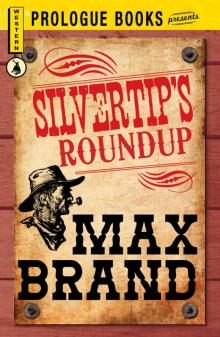 Silvertip's Roundup
Silvertip's Roundup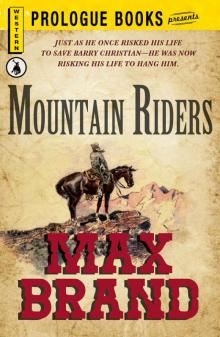 Mountain Riders
Mountain Riders Silvertip (1942)
Silvertip (1942)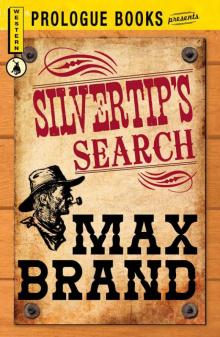 Silvertip's Search
Silvertip's Search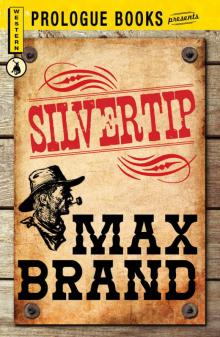 Silvertip
Silvertip Bull Hunter
Bull Hunter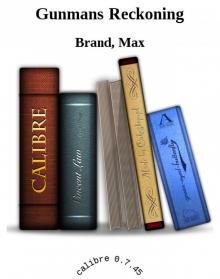 Gunmans Reckoning
Gunmans Reckoning The Seventh Man
The Seventh Man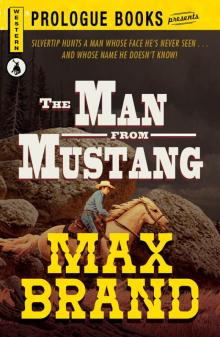 Man From Mustang
Man From Mustang Riders of the Silences
Riders of the Silences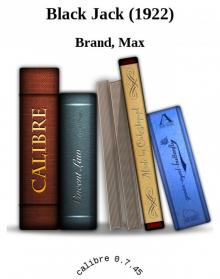 Black Jack (1922)
Black Jack (1922) Way of the Lawless
Way of the Lawless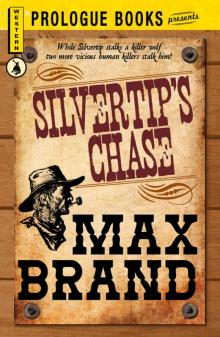 Silvertip's Chase
Silvertip's Chase Trailin
Trailin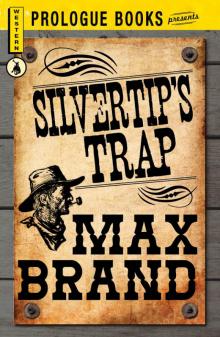 Silvertip's Trap
Silvertip's Trap Ronicky Doone (1921)
Ronicky Doone (1921) The Night Horseman
The Night Horseman the Garden Of Eden (1963)
the Garden Of Eden (1963)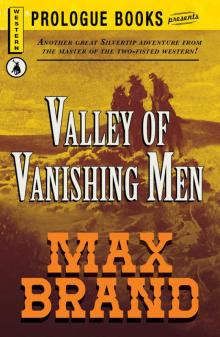 Valley of the Vanishing Men
Valley of the Vanishing Men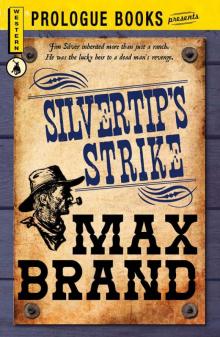 Silvertip's Strike
Silvertip's Strike Black Jack
Black Jack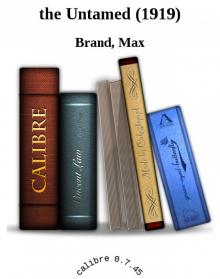 the Untamed (1919)
the Untamed (1919) Way Of the Lawless (1921)
Way Of the Lawless (1921) The Untamed
The Untamed